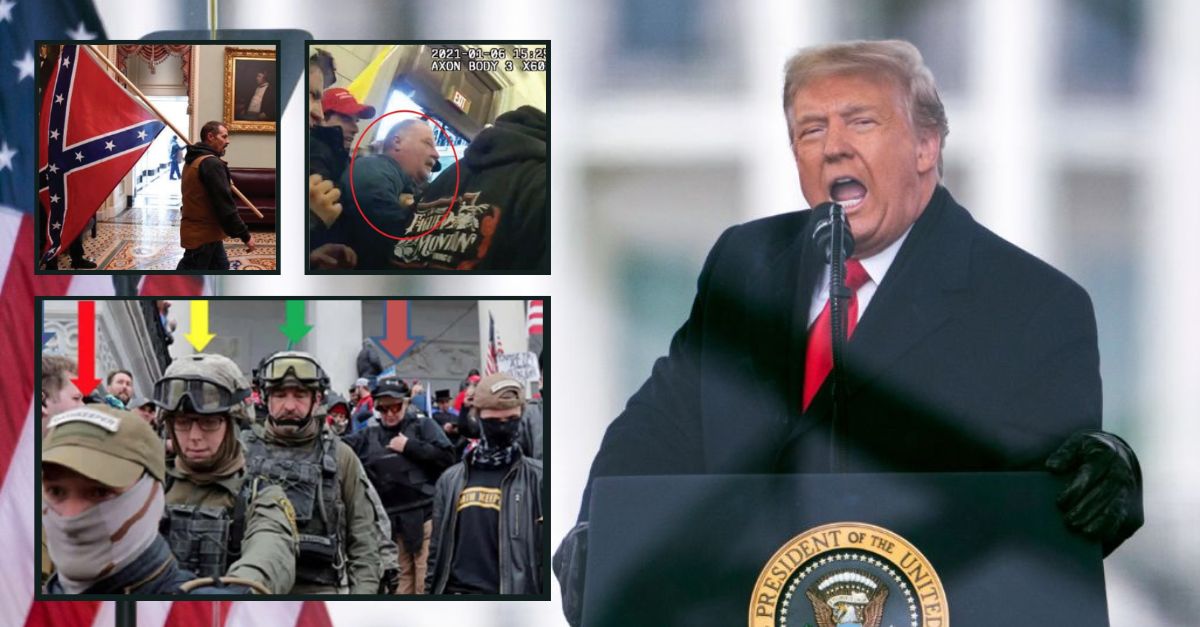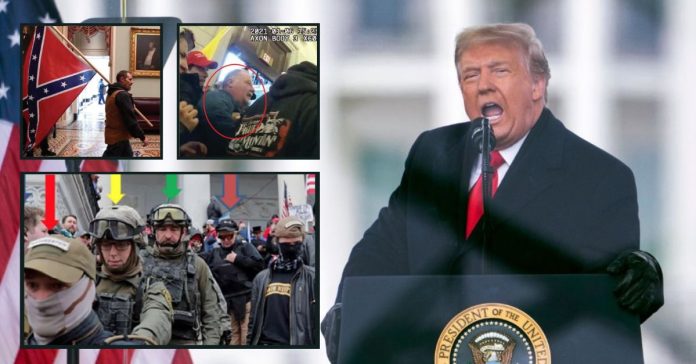
FILE – President Donald Trump speaks during a rally protesting the electoral college certification of Joe Biden as President in Washington, Jan. 6, 2021. (AP Photo/Evan Vucci, File). Insets clockwise from top left: Jan. 6 rioter Kevin Seefried carries a Confederate flag through the U.S. Capitol; Jan. 6 rioter Joseph Fischer inside the Capitol on Jan. 6, 2021; Oath Keepers in a stack formation on Capitol stairs on Jan. 6, 2021. Photos provided by U.S. Justice Department.
Justices at the U.S. Supreme Court on Tuesday appeared dubious and divided during oral arguments in Fischer v. United States, a case that could have huge ramifications on charges applied to hundreds of Jan. 6 rioters as well as charges against former President Donald Trump in his criminal election subversion case in Washington, D.C.
As Law&Crime previously reported, at the center of the arguments is a man named Joseph Fischer, a former police officer with the North Cornwall Township Police Department in Pennsylvania accused of yelling “Charge!” before running toward a line of police defending the Capitol on Jan. 6. Fischer is also alleged to have had a “physical encounter with at least one police officer” and prosecutors said he could be heard on footage screaming “hold the line” and “motherf—–” at them.
After Jan. 6, Fischer was remorseless. In a Facebook message he sent on Jan. 7, he complained about potentially needing a new job after his boss learned of his whereabouts. In another message, Fischer said he told the chief if losing his job was the “price I have to pay to voice my freedom and liberties which I was born with and thusly taken away, then [that] must be the price.”
“I told him I have no regrets and give zero sh—. Sometimes doing the right thing no matter how small is more important than one’s own security,” he proclaimed.
These details are important because for prosecutors, including Solicitor General Elizabeth Prelogar who argued for the government on Tuesday, it all goes toward proving Fischer’s corrupt intent to stop an official proceeding.
The statute Fischer and at least 350 other Jan. 6 rioters were charged or convicted under, 18 U.S. Code § 1512(c), states:
Whoever corruptly (1) alters, destroys, mutilates, or conceals a record, document, or other object, or attempts to do so, with the intent to impair the object’s integrity or availability for use in an official proceeding; or (2) otherwise obstructs, influences, or impedes any official proceeding, or attempts to do so, shall be fined under this title or imprisoned not more than 20 years, or both.
Fischer’s lawyer Jeffrey Green tried to persuade justices that this language — established roughly 20 years ago in response to the Enron scandal — was meant to cover the tampering with or destruction of evidence and that the subsequent use of “otherwise” in the statute’s language was overbroad, converting what was intended to be “catchall” provision into an unconstitutional “dragnet.”
Telling the high court that the statute should “be written more precisely,” Green argued the statute’s drafters never imagined it would automatically cover “official proceedings” and that they envisioned it only pertaining to “evidence” underlying a proceeding, if anything.
Though Justice Samuel Alito would seem to err more on his side later in arguments Tuesday, he nonetheless pressed Green, when he noted to the lawyer that the specific types of conduct laid out in the first sentence of the statute shared a commonality with what was laid out in the second.
“They all involve documents or objects and all involve the impairment of the integrity or availability for use in an official proceeding, so the similarity could be either of those things,” Alito said. “You may be biting off more than you can chew if you are indeed suggesting that the ‘otherwise’ clause can only be read the way you read it. It can certainly be read the way the government reads it and that might be the more straightforward reading.”
Fischer’s case has been anything but straightforward. When it was before U.S. District Judge Carl Nichols, a Trump appointee, he argued successfully that the obstruction charge was misapplied to him, convincing the court it only applied to a person taking some sort of action toward an official record or document Nichols ended up dismissing the count — he was the first of the federal judges overseeing Jan. 6 cases to do so — and the Justice Department appealed. The U.S. Court of Appeals sided with the government, 2-1, and found the statute covered congressional proceedings and documents alike.
Solicitor General Elizabeth Prelogar on Tuesday hammered this point to the high court, noting that the “fundamental wrong” committed by Fischer and others was “the deliberate attempt to prevent Congress from certifying the results of the election.”
“That is, they obstructed Congress’ work in that official proceeding,” Prelogar said.
Fischer’s bid was a conflation of the language, she argued.
Green, however, seemed perplexed at the idea. There already existed provisions about the destruction of records under 18 U.S. Code § 1519 and now the government, because it “didn’t get what [it] wanted” 20 years ago when writing the law, he said, was trying to apply a statute to “cover something” totally novel.
Justice Sonia Sotomayor interrupted Green.
“We never a had a situation before when we had a situation like this, with people attempting to stop a proceeding violently. I’m not sure what a lack of history proves,” she said.
The questions and hypotheticals the justices went on to pepper Prelogar and Green with indicated they will likely be sharply split on the matter. Justices Alito, Neil Gorsuch, Clarence Thomas and Brett Kavanaugh seemed to lean in Fischer’s favor, dubious over whether Congress meant to impose a 20-year prison sentence for disruption of an official proceeding and taking ample opportunity to compare protests elsewhere.
Justices Ketanji Brown Jackson and Amy Coney Barrett seemed more inclined to let the obstruction statute stand though Barrett seemed to have more reservations than Jackson. At one point, Barrett, who was appointed by Trump, asked what would have been different if rioters outside of the Capitol on Jan. 6 had been successfully repelled.
Prelogar explained: it came back to intent and to whether Congress was forced to stop the count. Plus, she said, not all Jan. 6 defendants are the same. Many people charged with the statute had been acquitted of it, she reminded the justice.
It was only Kagan and Sotomayor who seemed to early favor the government’s position outright.
18 U.S.C. § 1512(c)(2) has been used against at least 330 defendants charged with storming the Capitol as Congress met to certify the 2020 election, according to the Justice Department. More than 150 have been convicted under it already or pleaded guilty to it. That includes some of the more violent offenders on Jan. 6 as well as members and leaders of far-right networks like the Proud Boys and Oath Keepers who went on trial for seditious conspiracy. Notably, as Law&Crime reported just last month, prosecutors agreed to waylay sentencing for Oath Keeper Donovan Crowl until the high court resolves the debate.
The mere debate over the statute alone has won some convicted rioters their freedom already, including the Confederate flag-wielding Kevin Seefried. Seefried chased U.S. Capitol Police Officer Eugene Goodman up a flight of stairs. Trump-appointed U.S. District Judge Trevor McFadden released Seefried pending appeal of his conviction late last month.
Prelogar argued Tuesday that courts have recognized repeatedly that 1512(c) is “one of the big obstruction statutes aimed at official proceedings” and that despite claims that other, more narrowly-written statutes would be more applicable to Jan. 6 cases, the other facts of the day — and in Fischer’s case particularly — remain.
His misdemeanor counts, and those of several similarly situated others, don’t reflect the full culpability of their actions on Jan. 6, Prelogar said.
“The root problems with the petitioner’s conduct is that he knew about that [congressional] proceeding and said in advance of Jan. 6 that he was prepared to storm the Capitol, prepared to use violence. He said, ‘they can’t vote if they don’t breathe,’ and then he went on Jan. 6 and took action, including assaulting a law officer and that did impede the ability of another officer to regain control over the situation,” she said.
Justices are expected to rule the end of June.
As for the direct impact on Trump, a ruling in Fischer’s favor could lead to at least two of the charges brought against the ex-president by special counsel Jack Smith being dropped, but that isn’t a certainty. For Trump — who is accused of encouraging his supporters to go to the Capitol and “fight like hell” to keep him in power — those dismissals would require him to overcome significantly higher evidentiary hurdles than the average Jan. 6 rioter.
Have a tip we should know? [email protected]

